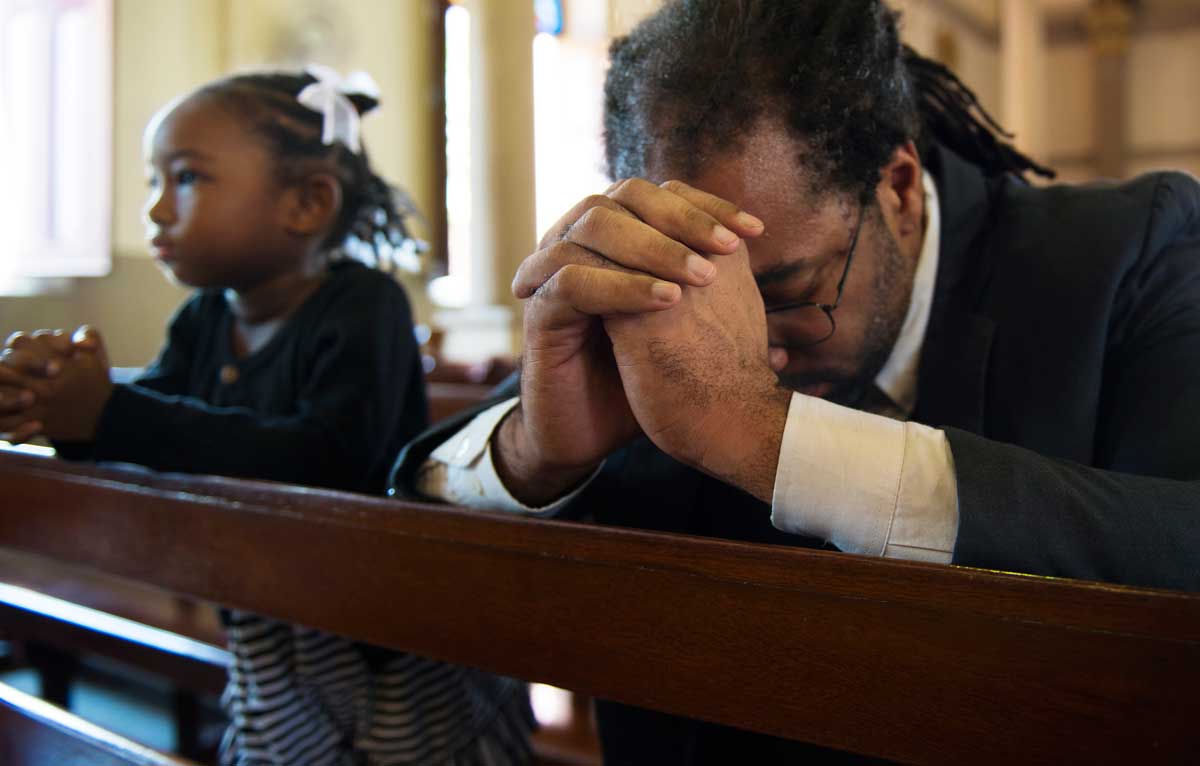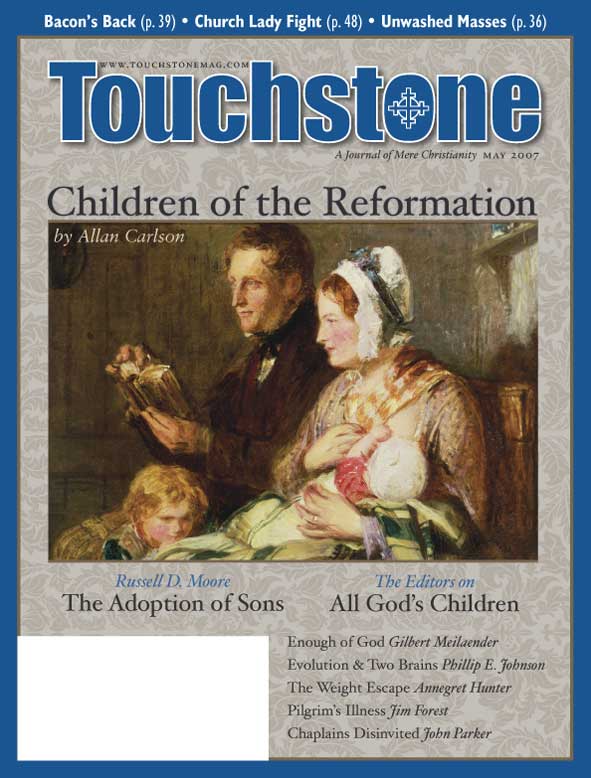All God’s Children
Families Need More Than Shoes on the Road to Heaven
Not so long ago, many families had four or five or even six or seven children. Now, to have six (as two of our editors do) makes people’s jaws drop, and to have even four (as three of us do) will elicit rude comments.
Several years ago, during a dinner at a Christian college, a woman at our table asked one of our wives how many children she had. Upon hearing the answer, the woman interrupted the conversations of her female companions with, “Hey! You all gotta hear this! She has six children!”
They were all married, all outspokenly devout Christian women who believed in the inerrant truth of “Be fruitful and multiply” and “Blessed is the man whose quiver is full of them [children].” And yet, as the conversation soon revealed, they could not imagine having more than two children—or possibly three.
Growing Decline
They represent, as observation and research both show, the dominant position among Western Christians. The families of church-going Christians have about the same number of children as families in the general population. Almost all of them believe that a couple can choose to remain childless, because bearing children is not essential to marriage, but a “lifestyle option.” At the extreme, some promote deliberate childlessness as “good stewardship.”
In Europe the birthrate is well below the replacement level of 2.1. Germany’s fertility rate is about 1.4, Spain’s and Italy’s about 1.3, for example, and these would be even lower but for the high birthrate among Muslim immigrants. Poland’s birthrate is below 1.3 and Russia’s is reportedly as low or lower. France’s and Ireland’s rates are the highest, but still below replacement level.
Their national economies are now threatened by having fewer (younger) workers supporting an aging population, and their cultures are threatened by the increasing percentage of their populations who do not share their history, religion, or values. Some government officials and intellectual leaders, though by no means all, are worried, but they are also at a loss as to how to reverse the decline.
They should be worried, for its reversal—a return to larger families—would require the great majority of citizens to adopt a life that they’ve never experienced: the sacrificial economy of large families. It would also require them to adopt an ideology or imagination that they have rarely, if ever, heard articulated, even in the churches: that of an economically sacrificial and risky generosity to the future, expressed and fulfilled through procreation.
Neither change is one that citizens of affluent Western societies are likely to make. Infertility will hurt their societies in the long run, but as John Maynard Keynes famously said, when challenged about the long-term results of his economic policies, “In the long run we’re all dead.” Fallen man needs some more compelling reason to sacrifice himself in the present than the likely suffering of some future generation. He worries far more about his children (and himself) than about his great-grandchildren.
He imagines that if he has a large family, his own children will suffer. (Americans worry especially about paying for college.) The idea of having more than one or two or perhaps three children intimidates almost any couple, who think they cannot possibly afford the extra child, because the “normal” life—the life that reaches the minimum level of affluence and security they think necessary (and have been told is necessary by their peers and by advertisers)—costs so much.
Such anxiety has been voiced in our hearing many times by young Christian couples cautiously contemplating having even their first child, and by others anxious lest they have a second or third through an “unplanned pregnancy.” Also, with each additional child, the probability of receiving rude comments rises.
The Good Family
Much can be done to correct the economic factors that discourage married couples from having many children, and our contributing editor Allan Carlson (organizer of this month’s World Congress of Families) is one of those who has thought most deeply and practically about this. But, as he himself would argue, there is a limit to what the wisest policies can accomplish when the hearts and minds of a people are set against fertility and entire societies hold a high level of affluence—one so high as to discourage couples from having more than one or two children—to be the minimum necessary for the good life.
We need a reason more compelling than predictions of future demographic problems to get us to sacrifice present comfort and what we think the happiness of our children. This reason is something that only a religion can provide. What Christians can offer this world is a true vision of the good life, and in particular the good of the family, which means, in general and with certain exceptions, the good of the large family.
Christians gladly accept their faith’s teachings that fertility is a blessing and that children are gifts from the Lord. They remember that God’s primary directive to man and woman at the Creation was to be fruitful and multiply. They understand that they are not given the gift of marriage primarily for themselves, but that, as the Anglican Book of Common Prayer put it, marriage was first “ordained for the procreation of children.”
But having children is not primarily a duty, though we follow the Creator’s instructions in doing so. It is the natural and inevitable expression of the joy flowing from the hope that is in us, the instinctive act of procreation by those who love the Creator and his creation and look forward in hope to the kingdom that shall have no end. Faith in the Resurrection removes not only our fear of death but also our fear of the maternity ward.
Having children is also a joy that brings immediate spiritual benefits. There is something of the divine in the generous and self-giving spiritual openness to children within the union of husband and wife. The kingdom of heaven belongs to children, and the reorientation of our families toward children will lead us ever closer to Christ and to the gifts and joys he has promised us.
Christ tells us that “he who receives one such child in my name receives me,” and we must remember that we receive children first through bearing them. “Whoever receives me,” he continues, “receives not me but him who sent me.”
In the light of Christ’s Resurrection, we discover that the world is not growing old but becoming new again. It is not made new through an abundance of material and perishable goods, but through the love of the Father. This love lies at the heart of the kingdom, and to receive it, we must become children. Those who generously welcome children into their lives understand that the good life is not given us through wealth and possessions.
We in the West might try to find the good life through affluence, but can only truly find it through a life the world thinks foolish and irresponsible. But our Lord did tell us that those who gave up their lives for his sake would find them.
— James M. Kushiner & David Mills, for the editors
James M. Kushiner is the Director of Publications for The Fellowship of St. James and the former Executive Editor of Touchstone.
David Mills has been editor of Touchstone and executive editor of First Things.
subscription options
Order
Print/Online Subscription

Get six issues (one year) of Touchstone PLUS full online access including pdf downloads for only $39.95. That's only $3.34 per month!
Order
Online Only
Subscription

Get a one-year full-access subscription to the Touchstone online archives for only $19.95. That's only $1.66 per month!
bulk subscriptions
Order Touchstone subscriptions in bulk and save $10 per sub! Each subscription includes 6 issues of Touchstone plus full online access to touchstonemag.com—including archives, videos, and pdf downloads of recent issues for only $29.95 each! Great for churches or study groups.
Transactions will be processed on a secure server.
more from the online archives

14.1—January/February 2001
The Christian Heart of Fatherhood
The Place of Marriage, Authority & Service in the Recovery of Fatherhood by John M. Haas
calling all readers
Please Donate
"There are magazines worth reading but few worth saving . . . Touchstone is just such a magazine."
—Alice von Hildebrand
"Here we do not concede one square millimeter of territory to falsehood, folly, contemporary sentimentality, or fashion. We speak the truth, and let God be our judge. . . . Touchstone is the one committedly Christian conservative journal."
—Anthony Esolen, Touchstone senior editor








